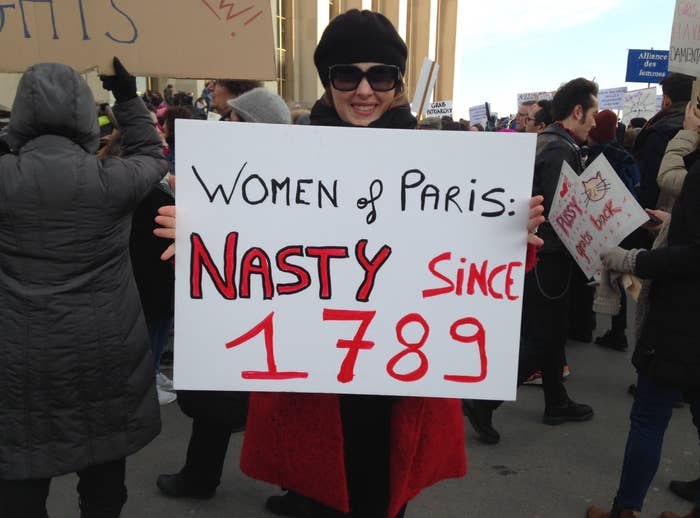
The inauguration of Donald Trump and the giant global protests that followed crystallized a central fact of the new political landscape: that it is truly international, for the first time since the 1960s, and bound together by technology in a way the reactionaries and revolutionaries of that decade couldn't have imagined.
The protests hit across the broader “West.” They began of all places in a stronghold of the old order, Brussels’ Place de la Monnaie, where a relatively modest 2,000 people turned up for a moment of silence as Trump was sworn in. They picked up a few hours later in Sydney and Auckland, and then as the sun rose in big protests in European capitals: London, Berlin, Rome. Then in the US, where many cities seem to have hosted the biggest protests in memory.
This new globalism — as Steve Bannon calls it — has not totally found its shape, but you see its outlines: feminism, internationalism, a deep concern for the rights of minorities and especially Muslims, the canaries in the coal mine of Western nationalism.
And if people turned out Saturday on seven continents — a few dozen scientists tramped out among the penguins in Antarctica — that too reflected the weakening of national identities, as well as the fact that the US is still the lone superpower and the fight with the highest stakes.
Trump’s inauguration — small and inward-looking as it was — was an equally global moment. It was the greatest triumph yet for the nationalist reaction on both sides of the Atlantic. The author of his inaugural address, Bannon, saw this early and clearly. In 2014 he described a “global revolt” spanning Europe, the Americas, and India, a “center-right populist movement of really the middle class, the working men and women in the world who are just tired of being dictated to by what we call the party of Davos.”
There is an inherent irony in “global nationalism,” of course. Will traditional American values really lead to the exact same place as traditional French and German ones? To the same destination as traditional Russian nationalism? Back in the 20th century, that was where you got wars. And the role of Russian money and media is another decidedly global thread in this new nationalist fabric.
But Bannon is also obviously right about the shared factors of the reaction against self-satisfied and preposterously prosperous elites. And he's right about the existence of a coherent counter movement, which nationalists label “globalist,” with anti-Semitic echoes meant or unmeant, depending on who you're talking to.
But who are these globalists? Are they the army of Davos? Certainly to a degree: A lot of the people I ran into in Washington today were well-educated professionals, globalization’s winners. Or are they the descendants of Occupy, the voice of globalization’s losers whom Bannon recognizes as kind of estranged siblings?
“The beginning of all this was the anti-globalization movement,” he pointed out to me in an email as the protesters tromped home Saturday evening. He suggested that “Trump's populism and nationalism really talk to the original economic issues these guys brought up.”
So far, Trump hasn't shaved off much of that lefty protest tradition. And the mirror-image global movements have a lot in common: they spread and define themselves on social media and globalizing media companies — BuzzFeed and Breitbart, Huffington Post, The Guardian, and the New York Times. The protests of 1968 — from Paris to Washington — had their common features, but the tight and instant emotional connection through media is something new. Social media proved powerful and fickle in the only recent precedent for these international movements, the Arab Spring. In the United States, the new social media politics has homogenized and polarized. Will the apparently secular Trump movement follow Russia and Poland toward traditional religious values? Will the whole left embrace the notion of a unified intersectional struggle that ties social and economic values together?
One of the great global questions is who, if anyone, gets to opt out of this binary struggle, and how its contours fit into unfamiliar contexts. Ideologues and diplomats have never gotten along, and it's easy to see why. Do the anti-establishment stirrings among young Mexicans ally them with Trump, whom they loathe? Would Trump prefer a Chinese leader who drew more on that country’s confrontational nationalism than the one who starred at Davos? And how does the anti-Muslim vitriol at the center of Western nationalism line it with natural allies among nationalists and strongmen in the Muslim world? (The confusion on the right over whether Turkey’s Erdogan is a friendly strongman or a Muslim enemy is instructive.)
Here in the US, perhaps the most striking consequence of this globalization is whom it leaves out: conservatives. Small-government Reaganism was always a homespun American product, its fervor viewed with curiosity even by strategic allies from London to Tokyo to Jerusalem, none of whom seriously question socialized medicine and other “big government” features. Trump’s nationalism is an obvious European import, a blood-and soil-ethnic politics that the Republican Party’s corporate-minded elite had kept at bay ever since importing its adherents from the Democrats in the 1960s.
Trump did not even breathe in the direction of small-government conservatism Friday. No conservative was allowed on stage at the women’s march a day later. And now those small-government conservatives have no party and no country. It's hard see what becomes of them.
